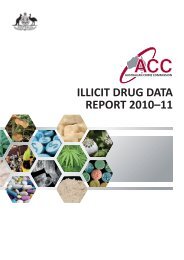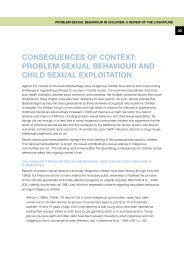Annual Report - COMPLETE - Australian Crime Commission
Annual Report - COMPLETE - Australian Crime Commission
Annual Report - COMPLETE - Australian Crime Commission
You also want an ePaper? Increase the reach of your titles
YUMPU automatically turns print PDFs into web optimized ePapers that Google loves.
The purpose of referring that matter for further consideration by the Examiner was<br />
not necessarily to preclude the applicant being required to answer such questions,<br />
but to ensure that the applicant’s rights to legal professional privilege were protected<br />
and also to ensure that there was no interference with the administration of justice<br />
in the confiscation proceedings. The Court granted the applicant liberty to apply on<br />
short notice to the Federal Court if the continued examination resulted in questions<br />
which breached those rights (Mansfield v <strong>Australian</strong> <strong>Crime</strong> <strong>Commission</strong> [2003] FCA<br />
1059 (3 October 2003)).<br />
In the second matter a person summonsed to appear at an ACC examination<br />
submitted that he was not required to answer the examiner’s questions. He argued<br />
that there has only been a partial abrogation of the privilege against self-incrimination,<br />
and that derivative use immunity is not expressly removed by section 30 of the<br />
ACC Act. He also argued that the power of the ACC to examine a class of people<br />
should be read down so that a person about to be charged with an offence cannot<br />
be examined. This is an extension of Hammond v The Commonwealth ((1982) 152<br />
CLR 188). The applicant had also foreshadowed argument on constitutional grounds<br />
but did not proceed with this argument.<br />
This matter was heard by Weinberg J. in the Federal Court who dismissed the<br />
application. The ACC was successful on all grounds (A. v. Boulton [2004] FCA 56<br />
(6 February 2004)).<br />
This is an important decision in support of the ACC’s coercive powers. In particular,<br />
Weinberg J. confirmed that the ACC Act, by necessary implication, abrogates<br />
the privilege against self-incrimination. The judgment affirmed the ACC’s power<br />
to examine a person who has not yet been charged with any criminal offence.<br />
The judgment also confirmed that there is no prohibition in the ACC Act upon the<br />
admissibility of derivative evidence obtained in an examination.<br />
The applicant subsequently appealed to the Full Federal Court. This appeal was<br />
dismissed (A v Boulton [2004] FCAFC 101 (30 June 2004)).<br />
Another matter challenging the ACC’s powers to compulsorily examine witness was<br />
also heard in the Federal Court. The ACC had summonsed 27 crew members of the<br />
North Korean freighter Pong Su to ACC examinations. The ACC was assisting the<br />
AFP’s investigation of the importation of 125 kgs of heroin, allegedly via the Pong Su.<br />
The 27 crew members had been discharged at committal in relation to this importation<br />
but three crew members and four other people were committed for trial. The ACC<br />
obtained passport surrender orders in respect of the 27 crew members to prevent<br />
them from leaving Australia until such time as they attended ACC examinations. This<br />
was the subject of argument and a final decision by Marshall J. in the Federal Court<br />
made in favour of the ACC.<br />
ACC ANNUAL REPORT 2003–04 I 73<br />
4<br />
OUTPUT 1.3: INVESTIGATIONS INTO FEDERALLY RELEVANT CRIMINAL ACTIVITY




